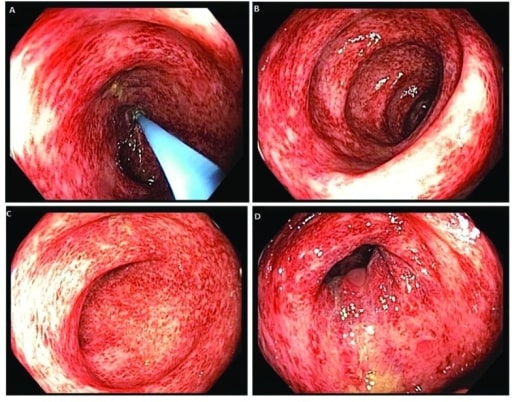Playlist
Show Playlist
Hide Playlist
Gastrointestinal Bleeding (GI Bleed – Emergency Medicine)
-
Emergency Medicine Bord GI Bleed.pdf
-
Download Lecture Overview
00:01 Hi. We're gonna be talking about patients who present to the Emergency Department with concern for gastrointestinal bleeding. 00:08 So we can go ahead and start out with a case study. 00:12 So this is a 45-year-old gentleman who presents to the Emergency Department with concern for 2 days of black stool and a lightheaded sensation. 00:20 When we're thinking about this, we wanna ask where is the patient bleeding from and also what are the key Emergency Department interventions for this patient? So when we think about patients who present to the Emergency Department with GI bleed, we often times divide bleeding up in to the upper GI tract or the lower GI tract. 00:38 The other thing that's important to remember, is that we always start with our ABCs. 00:44 So in situations of GI bleeding, the A and the B, you wanna make sure that the patient has a patent airway that they're breathing okay and then especially in a situation of bleeding, focusing on that circulation component. 00:56 So again, we're dividing our GI bleeding, into upper GI bleeding and lower GI bleeding. 01:03 And where is the dividing line here? For the most part, upper GI bleeding is bleeding that takes place from the stomach or from the upper portions of the small intestine. 01:13 For lower GI bleeding, that's bleeding that takes place in both the small, the more distal small intestine as well as the entirety of the large intestine. 01:23 The most common causes for upper GI bleeding is peptic ulcer disease, erosive gastritis or esophagitis, esophageal varices, and then Mallory-Weiss Syndrome. 01:36 So peptic ulcer disease is when a patient has an ulcer in their stomach or in the beginning parts of their small intestine. 01:42 This is often times a chronic problem where patients may experience painful abdominal pain potentially worst after eating, sometimes it’s better after eating depending on where that ulcer is located and at the base of that ulcer if there's a blood vessel and it gets eroded into the blood vessel, that's what causes the bleeding. 02:01 Esophageal varices are generally in patients who have liver disease and a liver diseases causes back up into the esophagus essentially and it makes those blood vessels there enlarged. 02:14 It's a variceal blood vessel, so it’s kind of having a variceal blood vessel on your leg and it's just abnormally friable blood vessel that's in the esophagus. 02:25 And then Mallory-Weiss Syndrome, is an element of small tears in the wall of the esophagus that cause patients to have bleeding. 02:33 It's most common in patients who have been vomiting a few times, they may go ahead and get a Mallory-Weiss tear, that's something that we see from time to time. 02:40 That's generally described as patient sees small kind of flux of blood in their vomit. 02:45 Now for lower GI bleed, there's lots of different causes. 02:49 Diverticulosis is one. 02:52 I just wanna take a moment to remind everyone that diverticulosis is what bleeds. 02:56 Diverticulitis generally is not associated with bleeding. 02:59 Diverticulitis is when you have an infection in the area of the diverticulum which are a little out pouchings of the intestinal wall. 03:09 Other things that can cause lower GI bleed are vascular ectasias, ischemic colitis and that's due to the fact that there's damage to the wall of the intestines due to their not being enough blood flow and that can cause blood in the GI tract. 03:24 Meckel's diverticulum. 03:26 Infectious colitis, so different bacteria can cause irritation and bleeding in the GI tract. 03:33 Inflammatory bowel disease such as ulcerative colitis and crohn's disease. 03:38 Something simple like hemorrhoids can cause bleeding. 03:41 And then the most serious thing that can cause bleeding is an aortoenteric fistula which is basically when the aorta and the bowel wall, and the bowel, kind of become connected, and as you can imagine that can cause a lot of bleeding. 03:56 So that's one of a rare thing but very worrisome. 04:00 So the highest morbidity here, for upper GI bleed it’s those esophageal varices, they can actually bleed quite a lot. 04:08 And for the lower GI bleed, the aortoenteric fistula which is rare and then followed by the diverticular bleed. 04:16 So patients who have diverticulosis can have a lot of bleeding from their GI tract. 04:21 Upper GI bleed is more common than lower GI bleed and the rates here are affected by H. pylori prevalence. 04:29 H. pylori is a bacteria that's very closely associated with the development of peptic ulcer disease. 04:35 So that's an additional test that sometimes is done when patients are complaining of abdominal pain or in patient in whom there's concern for peptic ulcer disease, they can get H. pylori testing from the blood or from the stool potentially, or also from biopsy samples from an endoscopy. 04:51 H. pylori prevalence is affected by socioeconomic factors in places that have lower socioeconomic classes, the rates of H. pylori are actually higher. 05:01 So you wanna keep that in mind when you're thinking about these patients. 05:05 Now, lower GI bleed like I said is less common than upper GI bleed and upper GI bleed is actually the most common cause for blood in the lower GI tract. 05:14 If you think about it, that actually make sense, right? Because what's happening is as you have blood in your stomach, the blood in your stomach is then going down into your small intestines and then into your large intestines. 05:25 So the bleeding kind of trickles its way down. 05:29 Lower GI bleed is more common among male patients and there's increase rates also in elderly patients. 05:36 The interesting thing about lower GI bleed is that a majority of them are actually resolves spontaneously without a whole lot of intervention. 05:43 That differs it from upper GI bleed. 05:45 Upper GI bleeds do sometimes stops spontaneously but more likely than not that's gonna respond better to an intervention. 05:53 Lower GI bleed is always one of those tricky things in the ED that the minute that you get a little more concerned, or that you wanna do additional work up, often times it will stop on its own. 06:03 So its one of those things where if you waited it out sometimes it will do its thing. 06:07 It's not to say those people don't need more evaluation or to be admitted to the hospital. 06:12 But just as an important thing for you to know. 06:15 Now, for those more serious causes like diverticular bleeds and for aortoenteric fistula, that's generally not something that always stops on its own.
About the Lecture
The lecture Gastrointestinal Bleeding (GI Bleed – Emergency Medicine) by Sharon Bord, MD is from the course Abdominal and Genitourinary Emergencies.
Included Quiz Questions
What is the mechanism behind GI bleeding in peptic ulcer disease?
- Ulceration eroding into an underlying blood vessel
- Presence of small tears
- Enlargement of blood vessels
- Increased pressure in the mucosa
- Weakness of the mucosa secondary to constant pressure
Which of the following is the most serious condition that can cause lower GI bleeding?
- Aortoenteric fistula
- Hemorrhoids
- Diverticulosis
- Ischemic colitis
- Inflammatory bowel disease
What causes the highest morbidity in upper GI bleeding?
- Esophageal varices
- Peptic ulcer
- Mallory-Weiss tear
- Gastritis
- Duodenal ulcer
Customer reviews
5,0 of 5 stars
| 5 Stars |
|
5 |
| 4 Stars |
|
0 |
| 3 Stars |
|
0 |
| 2 Stars |
|
0 |
| 1 Star |
|
0 |




